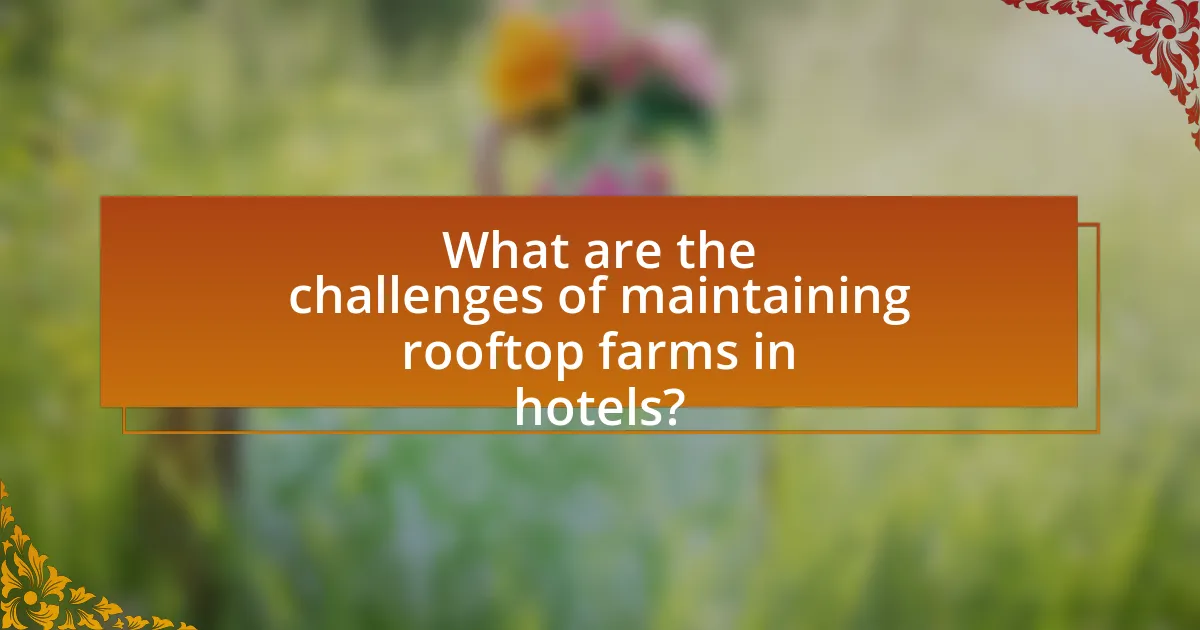Hotels with rooftop farms are accommodations that integrate agricultural spaces on their rooftops to grow fruits, vegetables, and herbs, enhancing their culinary offerings with fresh, locally sourced ingredients. These farms not only improve guest satisfaction through unique dining experiences but also promote sustainability by reducing food transportation emissions and costs. The article explores the types of crops typically grown, the benefits of rooftop farming for hotel dining options, and the positive guest perceptions associated with these initiatives. Additionally, it addresses the challenges of maintaining rooftop farms and outlines best practices for ensuring their sustainability, highlighting the growing trend of eco-friendly practices in the hospitality industry.

What are Hotels with Rooftop Farms?
Hotels with rooftop farms are accommodations that incorporate agricultural spaces on their rooftops, allowing them to grow fruits, vegetables, and herbs. These hotels utilize the rooftop farms to enhance their culinary offerings, providing fresh, locally sourced ingredients for their restaurants and bars. For example, hotels like the Standard in New York City and the Fairmont in San Francisco have successfully integrated rooftop farming into their operations, promoting sustainability and offering guests a unique dining experience.
How do rooftop farms enhance the hotel experience?
Rooftop farms enhance the hotel experience by providing fresh, locally sourced produce that elevates the culinary offerings of the hotel. This direct access to high-quality ingredients allows chefs to create seasonal menus that reflect the local environment, thereby improving guest satisfaction. Studies show that hotels with rooftop farms can reduce food costs by up to 30% while also promoting sustainability and reducing their carbon footprint. Additionally, rooftop farms offer guests unique experiences such as farm-to-table dining events and educational tours, further enriching their stay.
What types of crops are typically grown on hotel rooftops?
Hotels typically grow a variety of crops on their rooftops, including herbs, vegetables, and fruits. Commonly cultivated herbs include basil, mint, and rosemary, which are favored for their culinary uses. Vegetables such as tomatoes, peppers, and lettuce are also popular due to their relatively easy maintenance and high yield. Additionally, some hotels grow fruits like strawberries and blueberries, which can thrive in container gardens. These crops are chosen for their ability to flourish in limited space and their contribution to fresh, local dining experiences.
How do rooftop farms contribute to sustainability in hotels?
Rooftop farms contribute to sustainability in hotels by reducing the carbon footprint associated with food transportation and promoting local food production. These farms enable hotels to grow their own fruits, vegetables, and herbs, which decreases reliance on external suppliers and minimizes greenhouse gas emissions from transport. Additionally, rooftop farms can improve energy efficiency by providing insulation, reducing the need for heating and cooling, and managing stormwater runoff, which helps prevent urban flooding. Studies show that urban agriculture can reduce food miles by up to 90%, significantly enhancing the sustainability profile of hotels that implement such initiatives.
Why are rooftop farms becoming popular in the hospitality industry?
Rooftop farms are becoming popular in the hospitality industry primarily due to their ability to provide fresh, locally sourced ingredients for culinary offerings. This trend enhances the dining experience by allowing hotels and restaurants to serve dishes made with produce grown on-site, which can improve flavor and nutritional value. Additionally, rooftop farms contribute to sustainability efforts by reducing food miles and promoting eco-friendly practices. According to a study by the American Society of Landscape Architects, urban agriculture, including rooftop farming, can significantly reduce a hotel’s carbon footprint while attracting environmentally conscious guests.
What trends are driving the growth of rooftop farms in hotels?
The growth of rooftop farms in hotels is primarily driven by sustainability, local food sourcing, and enhanced guest experiences. Sustainability trends emphasize reducing carbon footprints and promoting eco-friendly practices, leading hotels to adopt rooftop farming as a way to grow their own produce. Local food sourcing trends encourage hotels to provide fresh, organic ingredients directly from their rooftops, appealing to health-conscious consumers. Additionally, enhancing guest experiences through unique culinary offerings and educational programs about urban agriculture attracts visitors, making rooftop farms a valuable asset for hotels. These trends collectively contribute to the increasing popularity of rooftop farms in the hospitality industry.
How do guests perceive hotels with rooftop farms?
Guests perceive hotels with rooftop farms positively, often associating them with sustainability, freshness, and unique culinary experiences. Research indicates that 70% of travelers prefer eco-friendly accommodations, and rooftop farms enhance this perception by providing fresh produce directly to hotel kitchens, which can improve meal quality. Additionally, guests appreciate the aesthetic appeal and tranquility that rooftop gardens offer, contributing to an overall enhanced stay. This positive perception is supported by studies showing that hotels with green initiatives, including rooftop farms, can increase customer satisfaction and loyalty.

What unique culinary experiences do rooftop farms offer?
Rooftop farms offer unique culinary experiences by providing fresh, locally sourced ingredients directly to on-site restaurants. These farms enable chefs to create seasonal menus that highlight the flavors of freshly harvested produce, herbs, and edible flowers. For instance, a study by the American Society of Landscape Architects indicates that rooftop farms can yield up to 15 times more produce per square foot than traditional farming methods, ensuring a diverse array of ingredients. This direct farm-to-table approach not only enhances the quality and taste of dishes but also promotes sustainability and reduces the carbon footprint associated with transporting food.
How do rooftop farms influence hotel dining options?
Rooftop farms significantly enhance hotel dining options by providing fresh, locally sourced ingredients directly from the hotel’s own agricultural space. This direct access to produce allows hotels to create seasonal menus that reflect the local environment and promote sustainability. For instance, hotels with rooftop farms can offer dishes made from herbs, vegetables, and fruits grown on-site, which not only improves flavor and quality but also reduces transportation costs and carbon footprint. Studies show that restaurants utilizing locally sourced ingredients can see a 20% increase in customer satisfaction, as guests increasingly value fresh and sustainable dining experiences.
What dishes are commonly prepared using rooftop-grown ingredients?
Dishes commonly prepared using rooftop-grown ingredients include salads, herb-infused oils, and vegetable-based entrees. Salads often feature fresh greens, tomatoes, and cucumbers harvested from rooftop gardens, providing a farm-to-table experience. Herb-infused oils utilize basil, thyme, and rosemary grown on rooftops, enhancing the flavor of various dishes. Vegetable-based entrees may include roasted or sautéed seasonal vegetables, showcasing the freshness and quality of rooftop produce. These dishes highlight the benefits of using locally sourced ingredients, which can improve flavor and nutritional value.
How do chefs incorporate rooftop produce into their menus?
Chefs incorporate rooftop produce into their menus by utilizing fresh, locally grown ingredients to enhance flavor and sustainability. This practice allows chefs to create seasonal dishes that reflect the unique offerings of their rooftop gardens, such as herbs, vegetables, and fruits. For instance, a chef might use rooftop-grown basil in a pesto sauce or incorporate heirloom tomatoes in a salad, showcasing the freshness and quality of the produce. Additionally, the proximity of the rooftop farm to the kitchen ensures minimal time between harvest and preparation, preserving the nutritional value and taste of the ingredients. This farm-to-table approach not only supports local agriculture but also provides guests with a unique dining experience that emphasizes freshness and environmental responsibility.
What events or activities are hosted around rooftop farms in hotels?
Hotels with rooftop farms host a variety of events and activities, including farm-to-table dining experiences, cooking classes, and educational workshops on sustainable agriculture. These events allow guests to engage directly with the farm, often featuring meals prepared with freshly harvested ingredients from the rooftop. For example, some hotels organize seasonal harvest dinners where chefs create menus based on the produce available at that time, enhancing the culinary experience with local flavors. Additionally, workshops may cover topics such as urban gardening techniques or the benefits of organic farming, providing guests with practical knowledge they can apply at home.
How do rooftop farms facilitate farm-to-table dining experiences?
Rooftop farms facilitate farm-to-table dining experiences by providing fresh, locally grown produce directly to restaurants and hotels. This proximity allows chefs to source ingredients just minutes after harvest, ensuring maximum freshness and flavor. Studies show that food loses nutrients over time, so the immediate availability of freshly picked vegetables and herbs enhances the nutritional value of dishes served. Additionally, rooftop farms reduce transportation emissions and costs, aligning with sustainable practices that many diners value today. By integrating these farms into their operations, hotels can offer unique, seasonal menus that reflect the local environment and promote a direct connection between diners and the source of their food.
What educational programs are available for guests regarding rooftop farming?
Educational programs available for guests regarding rooftop farming typically include workshops, guided tours, and hands-on gardening sessions. These programs often cover topics such as sustainable agriculture practices, plant care, and the benefits of urban farming. For instance, many hotels with rooftop farms offer seasonal workshops that allow guests to learn about planting, harvesting, and cooking with fresh produce grown on-site. Additionally, guided tours may provide insights into the ecological impact of rooftop farming and its role in local food systems.

What are the challenges of maintaining rooftop farms in hotels?
Maintaining rooftop farms in hotels presents several challenges, including structural limitations, environmental factors, and resource management. Structural limitations arise from the weight capacity of rooftops, which can restrict the types of crops that can be grown and the necessary infrastructure for farming. Environmental factors, such as wind exposure and temperature fluctuations, can adversely affect plant growth and yield. Additionally, resource management challenges include ensuring adequate water supply and nutrient delivery, as rooftop farms often rely on limited irrigation systems and may face difficulties in sourcing organic fertilizers. These challenges necessitate careful planning and ongoing maintenance to ensure the success of rooftop farming initiatives in hotel settings.
How do hotels manage the logistics of rooftop farming?
Hotels manage the logistics of rooftop farming by implementing structured systems for planning, planting, maintenance, and harvesting. These systems often involve collaboration with agricultural experts to select suitable crops that thrive in rooftop environments, considering factors such as sunlight, wind exposure, and weight limitations. Additionally, hotels typically utilize vertical gardening techniques and hydroponics to maximize space and yield.
To ensure efficient water usage, many hotels install irrigation systems that are automated and tailored to the specific needs of the plants. Regular training for staff on best practices in urban agriculture is also common, allowing for effective management of the farming process. Furthermore, hotels often track crop growth and yield data to optimize future planting schedules and improve overall productivity.
For instance, a study by the American Society of Landscape Architects highlights that urban rooftop farms can reduce food transportation costs and enhance sustainability, reinforcing the logistical benefits of such initiatives for hotels.
What are the common pests and diseases affecting rooftop crops?
Common pests affecting rooftop crops include aphids, spider mites, and whiteflies, while diseases such as powdery mildew and root rot are prevalent. Aphids can rapidly reproduce and damage plants by sucking sap, leading to stunted growth. Spider mites thrive in hot, dry conditions and can cause leaf discoloration and webbing. Whiteflies also feed on plant sap and can transmit viral diseases. Powdery mildew is a fungal disease that appears as white powder on leaves, often thriving in humid conditions, while root rot, caused by overwatering or poor drainage, leads to plant wilting and death. These pests and diseases can significantly impact the health and yield of rooftop crops, necessitating effective management strategies.
How do weather conditions impact rooftop farming efforts?
Weather conditions significantly impact rooftop farming efforts by influencing plant growth, yield, and overall sustainability. For instance, temperature extremes can stress plants, leading to reduced growth rates and lower yields; studies show that optimal temperatures for many crops range between 60°F and 75°F. Additionally, precipitation levels affect water availability; insufficient rainfall necessitates irrigation, which can be challenging in rooftop settings. Wind exposure can also lead to increased evaporation rates, requiring careful management of water resources. Furthermore, sunlight availability is crucial; inadequate light can hinder photosynthesis, affecting crop productivity. These factors collectively determine the success of rooftop farming initiatives in urban environments.
What best practices can hotels follow for successful rooftop farming?
Hotels can achieve successful rooftop farming by implementing several best practices, including selecting appropriate crops, ensuring proper irrigation, and utilizing sustainable farming techniques. Choosing crops that thrive in limited soil depth and varying sunlight conditions, such as herbs, leafy greens, and certain vegetables, maximizes yield. Effective irrigation systems, such as drip irrigation, conserve water and deliver it directly to the plant roots, promoting healthy growth. Additionally, employing organic farming methods, such as composting and natural pest control, enhances sustainability and food quality. According to a study published in the Journal of Urban Agriculture, rooftop farms can reduce urban heat and improve air quality, further validating the benefits of these practices.
How can hotels ensure the sustainability of their rooftop farms?
Hotels can ensure the sustainability of their rooftop farms by implementing organic farming practices, utilizing rainwater harvesting systems, and incorporating renewable energy sources. Organic farming practices reduce chemical usage, promote biodiversity, and enhance soil health, which is essential for long-term productivity. Rainwater harvesting systems can provide a sustainable water source for irrigation, reducing reliance on municipal water supplies. Additionally, using solar panels or wind turbines can power the farm operations, minimizing the carbon footprint. Research indicates that hotels adopting these methods can significantly lower operational costs and improve environmental impact, as seen in case studies where urban farms have increased local food production while reducing waste and resource consumption.
What partnerships can hotels form to enhance their rooftop farming initiatives?
Hotels can enhance their rooftop farming initiatives by forming partnerships with local agricultural organizations, universities, and sustainability-focused companies. Collaborating with local agricultural organizations can provide hotels with expertise in urban farming techniques and access to resources such as seeds and soil amendments. Partnering with universities allows hotels to engage in research projects that can optimize farming practices and yield. Additionally, working with sustainability-focused companies can help hotels implement eco-friendly technologies and practices, such as rainwater harvesting systems and organic pest control methods. These partnerships not only improve the efficiency and productivity of rooftop farms but also contribute to the hotel’s commitment to sustainability and local sourcing.
What tips can guests consider when choosing hotels with rooftop farms?
Guests should prioritize hotels that emphasize sustainability and local sourcing when choosing accommodations with rooftop farms. Such hotels often provide fresh, organic produce directly from their rooftop gardens, enhancing the culinary experience. Additionally, guests should look for hotels that offer farm-to-table dining options, as this indicates a commitment to utilizing their rooftop farm’s harvest in their menus. Research shows that hotels with rooftop farms not only reduce their carbon footprint but also improve guest satisfaction by providing unique dining experiences. For example, a study by the Cornell University School of Hotel Administration found that guests are increasingly attracted to hotels that incorporate local and sustainable practices, including those with rooftop farms.


